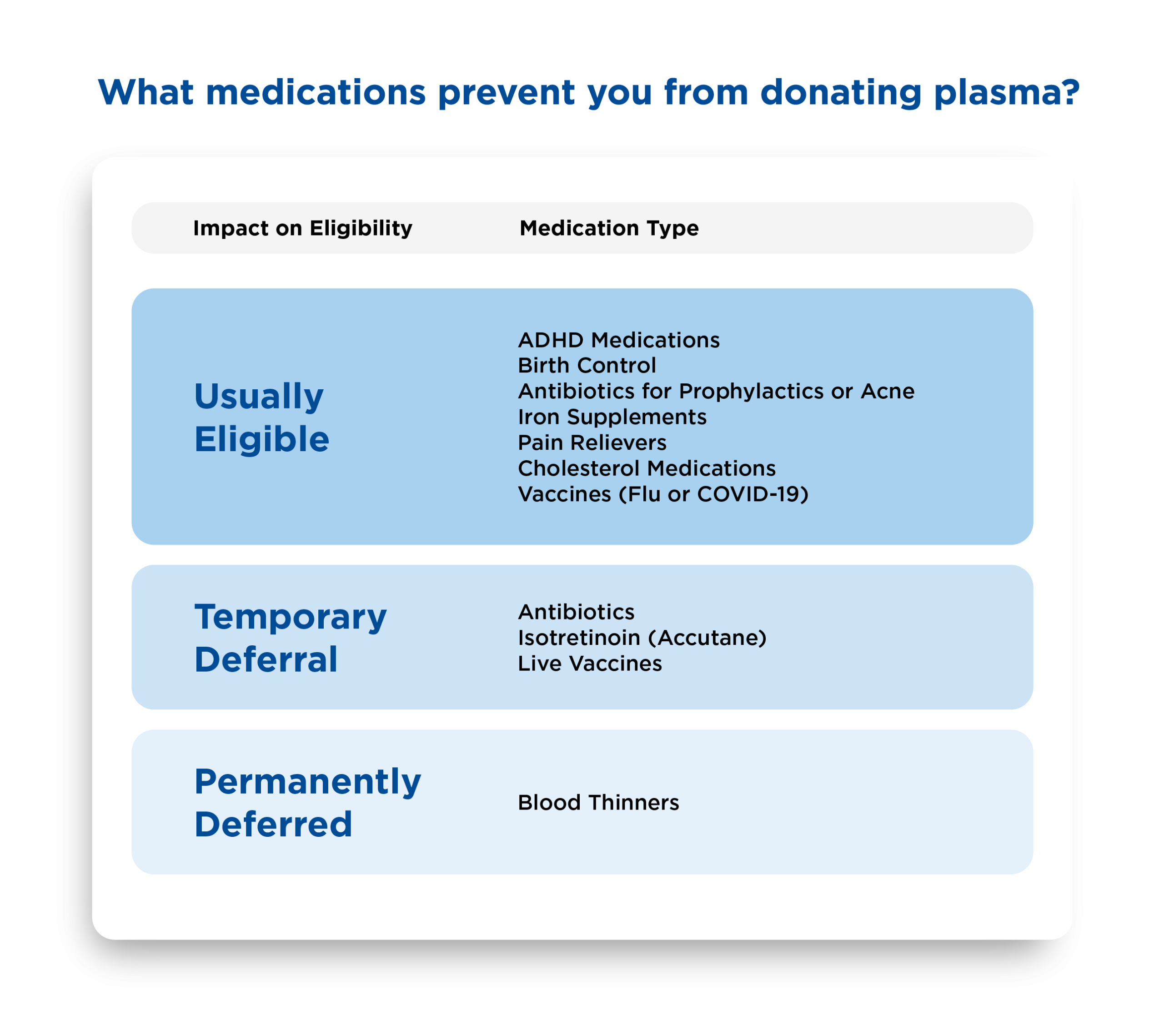Ever wonder if the medications you’re taking might disqualify you from donating plasma? Plasma donation is a life-saving process, but ensuring safety—for both donors and recipients—is of utmost importance. That means certain medications or conditions might lead to temporary or permanent plasma donation deferrals. If you’re on a medication but want to contribute to the life-changing power of plasma donation, this guide is for you.
We’ll cover what a medication deferral is, how medications can affect your ability to donate plasma, and provide a quick-reference list for common medications like Adderall, birth control, antibiotics, and iron supplements.
What is a Medication Deferral?
A medication deferral means you may be temporarily or permanently unable to donate plasma due to the medications you’re currently taking—or have taken recently. These deferrals exist to protect both you and the patients who rely on life-saving plasma treatments.
There are two types of medication deferrals:
- Temporary Deferral: This means you may be required to wait a certain period before you can donate. For instance, if you’ve recently taken a specific medication or undergone a medical procedure, you might be temporarily deferred.
- Permanent Deferral: This occurs when a donor is permanently prohibited from donating due to specific health conditions, medications, or medical history.
Temporary deferrals are the most common scenario when it comes to medications. It’s important to understand that these guidelines are in place to prioritize safety and effectiveness.
Can Medications Prevent You from Donating Plasma?
Yes, they can. Medications can stay in your body for a variable amount of time, and the plasma you donate may be used in critical treatments for patients with specific health conditions. If a certain medication might pose a risk to patients or compromise the plasma’s quality, it could lead to a deferral.
However, not all medications automatically disqualify you. Many are permissible, and some might only require a temporary waiting period before donation. If you’re unsure about a specific medication, your donation center will review your health history and current medications during the screening process.
Common Medications and Their Impact on Plasma Donation
Here’s a quick guide to how common medications might affect your eligibility to donate plasma. Keep in mind, it’s always best to verify directly with your local center.

-
Adderall and Other Attention Deficit Hyperactivity Disorder (ADHD) Medications
Usually No Deferral: Taking Adderall and similar ADHD medications typically does not disqualify you from plasma donation. However, notify the staff during your screening so they can confirm your eligibility.
-
Birth Control
Usually No Deferral: Oral contraceptives or other forms of birth control typically have no impact on plasma donation eligibility.
-
Antibiotics
Temporary Deferral: If you’re taking antibiotics, you’ll likely need to wait until your course of treatment is complete and you are symptom-free. Your deferral type and duration would be determined by your specific medical condition and antibiotic being used. This helps keep you safe and ensures your plasma doesn’t carry any residual infection.
Exception: Antibiotics prescribed for prophylactic purposes (such as an acne treatment) may be acceptable. Be sure to always disclose this during your health screening.
-
Iron Supplements
Usually No Deferral: Iron supplements are typically permitted. That said, plasma donation can affect your body’s iron levels, so make sure to stay consistent with supplementation and nourish your body with iron-rich foods like spinach, beans, or lean meats. For best results, learn more about what to eat before donating plasma to support a safe and successful donation.
-
Pain Relievers (e.g., Ibuprofen, Aspirin)
Usually No Deferral: Over-the-counter pain relievers like ibuprofen or acetaminophen are usually fine, but it’s important to disclose when you last consumed them during your screening session.
-
Accutane (Isotretinoin)
Temporary Deferral: Because isotretinoin can harm pregnant recipients, you’ll need to wait at least 30 days after your last dose before donating plasma. Keep in mind, you cannot donate plasma while pregnant due to health and safety concerns for both the donor and the recipient.
-
Blood Thinners (e.g., Warfarin, Coumadin)
Permanent Deferral: Blood-thinning medications disqualify you from donating plasma, as they can negatively affect clotting during the donation process and pose risks.
-
Cholesterol Medications (e.g., Statins)
Usually No Deferral: If you’re taking statins to control cholesterol levels, you can typically still donate plasma. Be sure to disclose these during screening.
-
Vaccines
Depending on the vaccine type:
Usually No Deferral: For flu or COVID-19 vaccines (e.g., Pfizer or Moderna).
Temporary Deferral: For live vaccines often requires a wait of up to 28 days.
What Should You Do if You’re Unsure About a Medication?
If you’re taking a medication not listed here—or if you’re unsure how your medication might affect plasma donation eligibility—it’s best to consult your plasma center directly.
Bring a List of Medications
To make the process smoother, arrive for your appointment with an up-to-date list of all the medications and supplements you’re currently taking. This will help the medical professionals quickly assess your eligibility.
Listen to the Experts
Donation centers follow guidelines set by the Food & Drug Administration (FDA) to maintain the highest safety standards. Trust the experts to ensure you and our recipients are protected by providing accurate information regarding your medication and medical history.
Why Medication Deferrals for Plasma Donation is Important
Plasma is a life-saving component used in medical treatments for chronic illnesses like immune deficiencies or hemophilia and other conditions. By donating, you’re giving others a vital resource they cannot get elsewhere. Even if you’re temporarily deferred, your contribution could still be possible at a later date.
Ready to Donate Plasma?
Are you ready to help save lives and earn money while donating plasma? Visit your local plasma donation center or check out our website to learn more about eligibility and the plasma donation process.
Know someone on medication who’s wondering if they can donate? Share this post to spread awareness and encourage more life-saving plasma donations. Together, we can make a difference.







